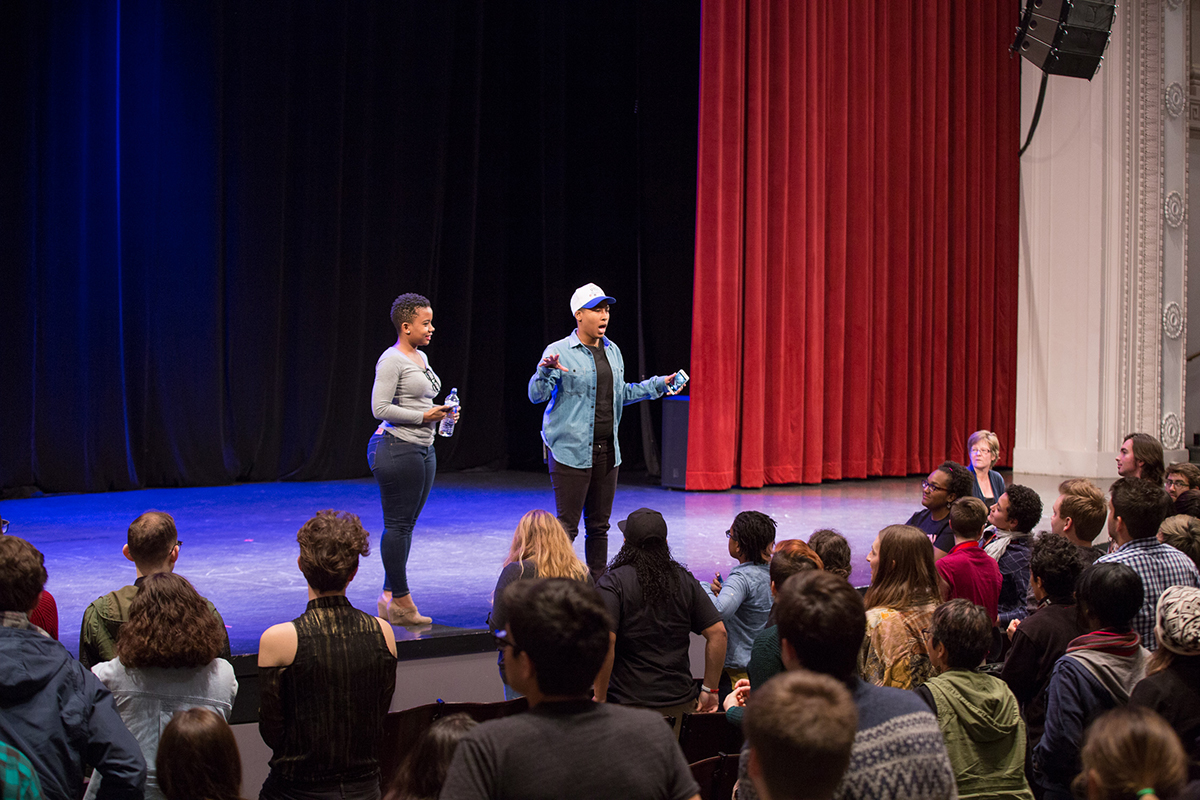Ferguson activists speak at Cornell IvyQ conference
By Michelle Yang

In their keynote address at the IvyQ conference Nov. 14 in Bailey Hall, Brittany Ferrell and Alexis Templeton raised awareness of the struggles faced by those “marginalized within the marginalized” – African-American LGBTQ, women and youth. Their message stressed incorporating intersectionality – “the various forms of oppression meeting at an intersection,” Templeton explained – in the fight for social justice for all black lives.
“As a gender nonconforming person, this movement is fundamentally about our lives and the lives of those we love,” said Templeton, a 21-year-old who was involved with the Ferguson, Missouri, protests against the 2014 shooting of unarmed African-American teen Michael Brown.
Ferrell and Templeton co-founded Millennial Activists United (MAU), a women- and queer-led grassroots LGBTQ+ inclusive organization that fights for black liberation. MAU creates a refuge for the marginalized and has mobilized civil disobedience and direct action while emphasizing intersectionality. Ferrell and Templeton married three months after meeting in Ferguson.
“I came out [of the movement] and realized that I’m a black, queer and gender nonconforming person. I bring all of that. I can’t leave two-thirds of myself at home,” Templeton said. “Intersectionality is not an abstract or theoretical idea. It is obtainable, but it requires a critical lens, and requires examining the structures of power that so successfully resist change, for example white supremacy, racism and patriarchy.”
Ferrell pointed out not only the continuous presence of transgender and queer people invested in this work, but also the absence of their recognition as well, such as little-known Bayard Rustin, an openly gay man who brought the practices of Gandhi to Martin Luther King Jr.’s civil rights movement.
Ferrell said women in the front lines of the movement often do a lot of work, such as treating the injured or encouraging discussions, but need opportunities to lead in the overwhelmingly cisgender, heterosexual and male-led black liberation movement.
“This is an intersectional movement, or it is not our movement,” Ferrell said.
She and Templeton delivered one of three keynote addresses at the IvyQ conference Nov. 12-15. The student-run event, which strives to create a “pan-Ivy community of LGBTQ students and allies with the skills to examine their identities, value those of others and understand intersectionality,” was held at Cornell for the first time in its seven-year history. The student-funded event gave voice to graduate and undergraduate students and community organizations, and attracted nearly 400 students from across the country to its workshops, keynote addresses, social activities and career fair.
According to Brian Patchcoski, associate dean of students and director of the Cornell LGBT Resource Center, “The conference was focused on those facing the majority of marginalization and violence within the LGBTQ+ community – inclusive of racial identity, socioeconomic access and gender equity. The IvyQ planning team did an amazing job in promoting access to the event by offering travel scholarships, food sponsorships and other financial aid. IvyQ 2015 provided more financial support for attendees than any other IvyQ conference in history, which is something all of us at Cornell can take pride in.”
Patchcoski continued, “At this moment in higher education and the world, conversations reflecting on these issues and their intersections are much needed. Identity is complex and I believe in opportunities such as IvyQ we can challenge our communities to grow, but also support them in that growth by providing the resources and skills necessary for change.”
Michelle Yang ’18 is a writer intern for the Cornell Chronicle.
Media Contact
Get Cornell news delivered right to your inbox.
Subscribe